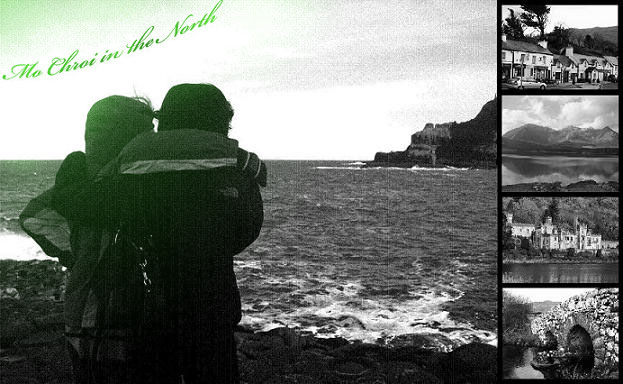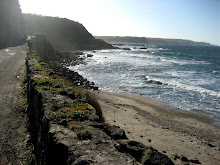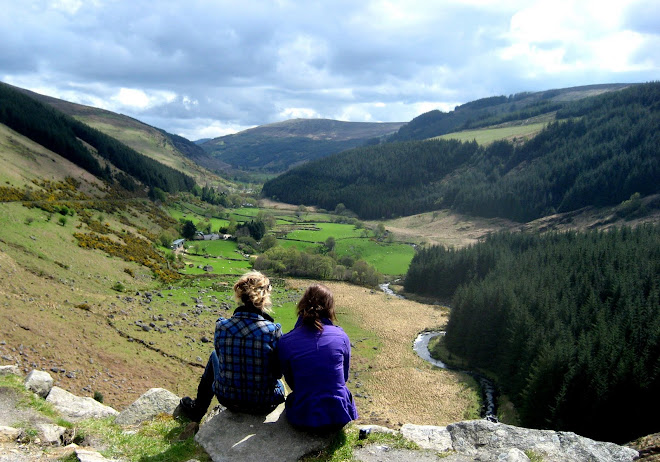Good morning!
I'm kind of stressing as my internet in my flat has died, and I have to get two papers e-mailed to Nigel by this afternoon. I have a meeting in a bit here at work, so I'll see if I can get a flash drive loaned to me afterwards and if I can get a chance to run home. Sigh! Nothing can be easy.
Besides that, I realized on my to work this morning that I need to clarify a few things about where I am and what I'm studying. I really have no idea who all reads this blog and what knowledge is out there, but I want to say a few basic facts just so everyone is on the same page. Lately when I've been chatting with people from home, I realize there is very limited knowledge on the topic of the conflict in Northern Ireland. Here we go:
1. I'm in Northern Ireland, not Ireland. They are different countries. It's on the same island, but it is a small section made up of 6 counties known as "Northern Ireland" or "Ulster" and is part of the United Kingdom.
2. Very basically, this is what the roots of the conflict is about. Many People from the Republic of Ireland (largely Catholics) want Northern Ireland to be unified with them, and many people in the North and from English descent (largely Protestants) wish to have Ulster remain part of the United Kingdom. It's partially a religious conflict, and it's partially a national pride/identity conflict. It is all extremely messy and complicated, and Nigel says "If you're not confused here, you don't know what's going on."
3. Ulster is made up of approximately 60% Protestants and 40% Catholics, and Catholics have been gaining a steady increase over the past years. This can partially be blamed on many Protestants migrating to England, and the fact that a lot of Catholics have qualms with contraception. This is all very general and not true for everyone, but Protestants are widely regarded as "unionists," meaning they want Northern Ireland and England to maintain their union, and the more extreme unionists are referred to as "loyalists." Loyalist is a broad term that can mean something more extreme than unionist. Loyalists generally aren't afraid to use violence and extreme measures to fight for their cause.
On the other hand, Catholics are widely regarded as "nationalists", meaning they feel as though their identity lies in the Irish heritage and want Ulster to be returned to the Republic of Ireland and the UK to stop interfering. More extreme nationalists are known as "Republicans".
4. The IRA and the UVF/UDA are the two main sects of paramilitarism. These associations have been called "terrorist groups" and have often been responsible for much of the violence in Northern Ireland. There's been over 3,000 troubles-related deaths, and almost everyone here knows someone who has been injured or killed in the last 50 years.
5. The "Good Friday Agreement" in 1998 was the main agreement to end the conflict. It followed a cease fire of the IRA and the UVF/UDA, allowed all criminals in prison due to troubles-related crimes to go free, and included various other compromises. This was the one of the first major steps towards peace in the country, but there is still an extremely long way to go.
6. Although the Good Friday Agreement was signed 10 years ago, many barriers still stand in the way of peace here. Schools are mainly segregated-Protestants go to state-run schools and Catholics to private, Catholic schools. "Peace walls" are large walls that run through neighborhoods in cities and are put in place to reduce contact between the two communities, as their neighborhoods are mainly segregated. There are about 30 "peace walls" in Belfast. About 5% of schools are integrated, and mixed-marriages are still at a low percentage as well. Many children only associate with people from their own community and there is a certain "fear of the outsider". Like I said before, all of this is very basic and certainly doesn't apply to every person and opinion here, but in terms of general issues, these are some that I've witnessed.
I didn't know any of this before I came here either, and I'm not trying to sound intelligent and/or superior. I'm not really sure why I don't remember any of this being talked about in school growing up-maybe I was sick the day they decided to mention the Troubles, or maybe we spent more time on other subjects and this one was forgotten or not a priority. Either way, it's been a prominent conflict in the world and I wish I could've had the chance to have been educatd about it earlier.
There's more I should say, but as I am at work I should probably do work related things. I must pop into a meeting in a few minutes, so I'll try to get my internet worked out at home and update later. Hope this finds everyone well!
Cheers,
Karen
Friday, March 6, 2009
Subscribe to:
Post Comments (Atom)




No comments:
Post a Comment